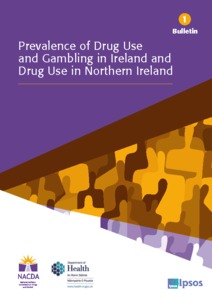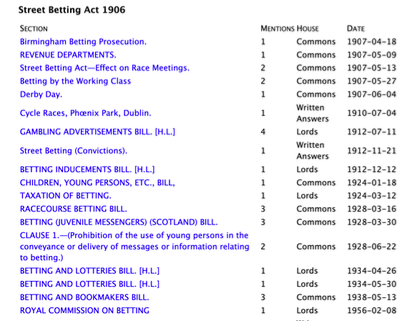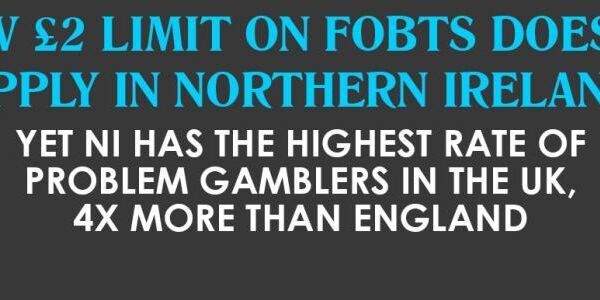2016 Northern Ireland Gambling Prevalence Survey
Monthly updates archive and previously published annual bulletins.
- 2016 Northern Ireland Gambling Prevalence Survey Sites
- 2016 Northern Ireland Gambling Prevalence Survey 2019
- 2016 Northern Ireland Gambling Prevalence Survey Chart
2016 Northern Ireland House Condition Survey (HCS) The 2016 HCS report, which was published in May 2018, presents a comprehensive overview of Northern Ireland’s dwelling stock and its occupants in 2016, including information about fuel poverty, disrepair, Decent Homes, the Standard Assessment Procedure (SAP), the Housing Health and Safety Rating System (HHSRS), unfitness, and household profiles. In Ireland from the fourth drug prevalence survey of households in Ireland and Northern Ireland. Within Ireland the survey sampled a representative number of people aged 15+ from August 2014 to August 2015. The bulletin presents results regarding last year prevalence and last month prevalence rates for gambling in Ireland. As mentioned previously, the BESES survey shows that Northern Ireland sold four times more goods and services to Great Britain than to the Republic of Ireland and imported nearly six times more from Great Britain than it imported from the Republic of Ireland in 2016 1. However, the current data sources do not provide the equivalent detailed. House Condition Survey? The Northern Ireland Housing Executive has a statutory. Responsibility to carry out housing research, which is set out in the Housing (NI) Order 1981. The 2016 House Condition Survey is the twelfth such survey to be carried out in Northern Ireland since 1974. What information does the. House Condition Survey produce?
Previously published annual bulletins
Caution should be taken when comparing crime from these time periods with figures from more recent years, particularly figures reported before and after April 1998. This is due to changes and improvements in crime recording practices and systems over time, and also changes in crime classifications and categories.
Further information on the changes and improvements in recording practices, systems and classifications can be found in the Police recorded crime statistics user guide (PDF, 864 KB)
Monthly update, period ending 30 October 2020 (published 26 November 2020)
Crime tables
Monthly update, period ending 30 September 2020 (published 29 October 2020)
Crime tables
Monthly update, period ending 31 August 2020 (published 24 September 2020)
Crime tables
Monthly update, period ending 31 July 2020 (published 27 August 2020)
Crime tables
Monthly update, period ending 30 June 2020 (published 30 July 2020)
Crime tables
Monthly update, period ending 31 May 2020 (published 25 June 2020)
Crime tables
Exceptional Release, Police Recorded Crime in Northern Ireland since lockdown measures were introduced on March 23.
This bulletin was first published on 6th May with the final bulletin in the series published on 17th June. The monthly update publication schedule resumed on Thursday 25th June and incorporates some aspects from this exceptional release.
Monthly update, period ending 31 March 2020 (published 15 May 2020)
Crime tables
Monthly update, period ending 31 March 2019 (published 17 May 2019)
Crime tables
Monthly update period ending 31 March 2018 (published 17 May 2018)
Summary tables
Data in excel pivot table format
- Excel spreadsheet (3.8 MB) (May take a few minutes to download).
Monthly update period ending 31 March 2017 (published 17 May 2017)
Summary tables
Data in excel pivot table format
- Excel spreadsheet (3 MB) (May take a few minutes to download).
Monthly update period ending 31 March 2016 (published 12 May 2016)
Summary tables
Data in excel pivot table format
- Excel spreadsheet (6 MB) (May take a few minutes to download).
Monthly update period ending 31 March 2015 (published 12 May 2015)

Summary tables
Data in excel pivot table format
- Excel spreadsheet (6 MB) (May take a few minutes to download).
Monthly Update to 31 March 2014 (published 08 May 2014)
- Accompanying excel spreadsheet (9 MB) (May take a few minutes to download).

Monthly Update to 31 March 2013 (published 9 May 2013)
- Accompanying spreadsheet (6 MB) (May take a few minutes to download).
Monthly Update to 31 March 2012 (published 10 May 2012)
- Accompanying spreadsheet (6 MB) (May take a few minutes to download).
2016 Northern Ireland Gambling Prevalence Survey Sites
Police recorded crime Annual Trends 1998/99 to 2018/19 (published 8 November 2019)
Summary tables
Police recorded crime Annual Trends 1998/99 to 2017/18 (published 31 October 2018)
Summary tables
Latest annual trends bulletin, period ending 2015/16 (published 01 December 2016)
Summary tables
Data in excel pivot table format
- Crime excel spreadsheet (3.5 MB) (May take a few minutes to download).
Trends in Police Recorded Crime in Northern Ireland 1998/99 to 2014/15 (published 06 August 2015)
Summary tables
Data in excel pivot table format
- Crime spreadsheet (5 MB) (May take a few minutes to download).
Trends in Police Recorded Crime in Northern Ireland 1998/99 to 2013/14 (published 03 July 2014)
- Pivot tables - crime (4 MB) (May take a few minutes to download).
- Pivot tables - victim age and gender (2 MB) (May take a few minutes to download).
Trends in Police Recorded Crime in Northern Ireland 1998/99 to 2012/13 (published 05 July 2013)
- Pivot tables - crime (5 MB) (May take a few minutes to download).

Trends in Police Recorded Crime in Northern Ireland 1998/99 to 2011/12 (published 05 July 2012)
- Pivot tables - crime (4 MB) (May take a few minutes to download).
Trends in Police Recorded Crime in Northern Ireland 1998/99 to 2010/11 (published 30 June 2011)
- Accompanying spreadsheet (3 MB) (May take a few minutes to download).
- Recorded Crime in Northern Ireland 2010/11 (PDF, 758 KB) (published May 2011)
- Recorded Crime in Northern Ireland 2009/10 (PDF, 228 KB) (published May 2010)
- Recorded Crime in Northern Ireland 2008/09 (PDF, 238 KB) (published May 2009)
- Recorded Crime in Northern Ireland 2007/08 (PDF, 288 KB) (published May 2008)
- Recorded Crime In Northern Ireland 2006/07 (PDF, 80 KB) (published May 2007)
- Recorded Crime In Northern Ireland 2005/06 (PDF, 797 KB) (published May 2006)
- Recorded Crime in Northern Ireland 2004/05 (PDF, 416 KB) (published May 2005)
- Recorded Crime in Northern Ireland 2003/04 (PDF, 291 KB) (published May 2004)
- Recorded Crime in Northern Ireland 2002/03 (PDF, 62 KB) (published May 2003)
If you would like to comment on any statistics or publications, receive notification of the publications or be informed of developments, then please forward your contact details and we will add you to our email list.
If you are from a press/media organisation and have a query about statistics then please contact the PSNI’s Press Office directly.
All content is available under the Open Government Licence unless otherwise stated.
Prior to 2002/03, police recorded crime statistics were published in the annual Report of the Chief Constable. These reports were published in calendar year format from 1968 until 1997. Since then, reports have been based on financial years (April to March). Scanned images of the relevant crime tables from these reports, dating from 1968 until 2001/02. have been made available via the links below.
- 1968 to 1972 crime tables
- 1973 to 1980 crime tables
- 1981 to 1984 crime tables
- 1985 to 1990 crime tables
- 1991 to 1997 crime tables
- 1997 to 2002 crime tables
THERE HAVE BEEN at least around 800 cases in Ireland where people sought help with gambling addiction since 2015, but these official HSE figures have been labelled “the tip of the iceberg”.
The figures were released to Sinn Féin’s Louise O’Reilly, who asked Minister for Health Simon Harris how many people had been treated for gambling addiction since 2015.
Harris sent O’Reilly’s request to the HSE but the body subsequently admitted its own figures don’t paint an accurate picture of the scale of gambling addiction in Ireland.
The Dublin Fingal TD told TheJournal.ie that the government has refused to engage on methods to try to understand problem gambling in this country, and that we are already in the midst of a crisis that is going largely unnoticed by the government.
In its reply to O’Reilly, the HSE said that its addiction services have been “traditionally funded to treat problematic drug and alcohol use, some cases of problematic gambling have been provided with treatment”.
‘Optional’ reporting

In supplying the figures, the HSE said that the numbers available related to the number of cases reported to the National Drug Treatment Reporting System (NDTRS).
“Reporting of gambling to the NDTRS is optional,” it said. “Therefore, these figures cannot be considered complete or representative of the treatment for gambling in a national context.”
Nevertheless its figures show that there were 208 cases in 2015, 195 in 2016 and 219 in 2017. These were cases where gambling was designated the “main problem” in those presenting for treatment.
In all, that’s 622 cases in that three-year period.
The figures aren’t yet finalised for 2018 but, with 60% of all relevant data available, there were 174 cases where patients were treated for a gambling addiction.
So, since 2015, there has been just under 800 cases – at the very least – where people presented with gambling addiction to a service under the auspices of the HSE.
It is more than likely that these figures vastly underestimate the true volume of problem gambling in Ireland, as the HSE noted in its response.
The issue with the NDTRS is that a form must be completed by each person presenting for treatment related to their drug, alcohol or in this case gambling use.
People also often turn to private providers and charities who offer addiction supports outside the remit of the HSE.
There is scant data available on the prevalence of problem gambling in Ireland, but research has been done in the UK to try to get a picture of how pervasive the issue is.
In England in 2016, it was estimated that there were around 300,000 problem gamblers, which is under 0.5% of the population.
The picture is far bleaker in Northern Ireland, which estimates that 2.3% of the population is classified as a problem gambler, or around 43,000 people.
‘Dedicated study’
We don’t know what this figure is in Ireland because the dedicated studies on it simply have not been done.
There is some data available on how much Irish punters have lost on gambling, with a study by The Economist in 2017 saying Ireland’s gambling losses totalled €2.1 billion a year, or €470 per adult.
O’Reilly said it was important that this problem was no longer ignored.
She said: “We are not drifting towards a gambling crisis, we are in the middle of one and the government are afraid to look under the bonnet to see how big that crisis is.
With the Gambling Control Bill 2013 put forward by the government in the doldrums for quite some time, and a revised bill put forward by Fianna Fáil a year ago this month making slow progress in the Dáil, inaction is continuing from the government in legislating the gambling industry and the issues facing problem gamblers.
2016 Northern Ireland Gambling Prevalence Survey 2019
The Department of Health does have data on gambling use in Ireland on the way, but that will be based on data from 2014/15.
That will form part of the Drugs Prevalence Survey, which published its first tranche of data in 2016. The government has promised that more fuller data on gambling within our culture from that survey will be published soon.
Sinn Fein’s O’Reilly believes that is not enough and wants the government to be more proactive on the issue.
2016 Northern Ireland Gambling Prevalence Survey Chart
“I’ve been calling for a dedicated gambling prevalence survey so we can understand the scale of the problem in this State, however, to date the government refuse to engage,” she said. “In fact, they even refuse to run a problem gambling awareness campaign.”